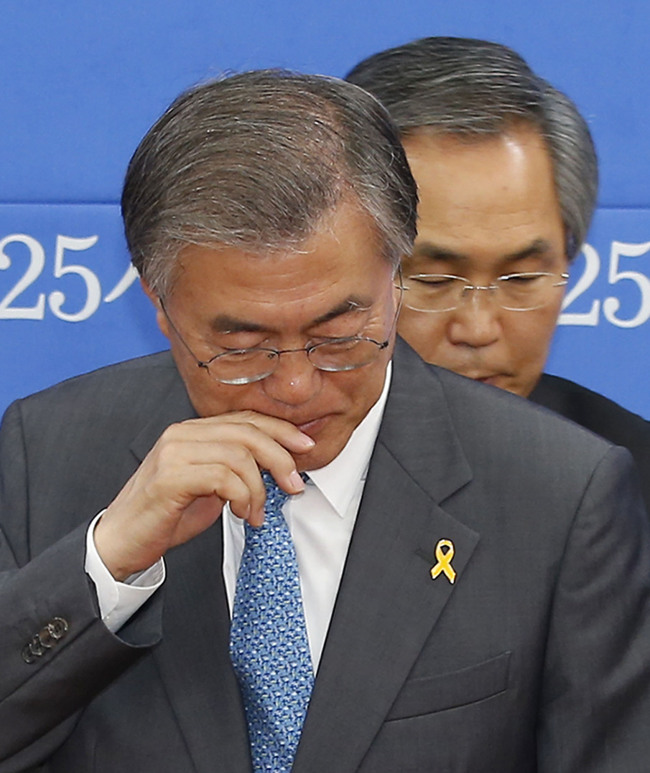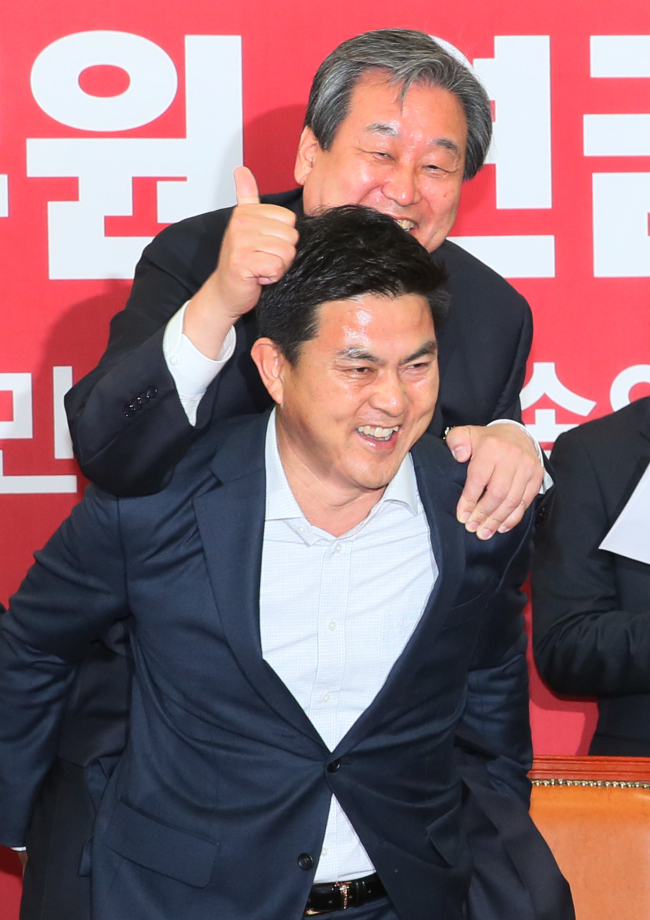Korea’s main opposition party is expected to face a severe internal power struggle between two factions consisting of loyalists to two former liberal presidents, while the governing party readies to push ahead with its reform drive after its unexpected victory in the parliamentary by-election Wednesday.
Moon Jae-in, leader of the New Politics Alliance for Democracy, apologized Thursday for the party’s crushing defeats in the by-election and laid the blame on himself. Moon, however, did not elaborate on whether or not he would retain his post.
“Without pointing fingers, we will look back on our deficiency and start afresh with a do-or-die resolution,” Moon said.
 |
| Moon Jae-in, the leader of the main opposition New Politics Alliance for Democracy, attends a party meeting in the National Assembly in Seoul on Thursday. (Yonhap) |
Moon also urged the party members to stick together as it faces a long-term process of reform.
“Taking this as medication, we will reform and integrate the party in a longer-term perspective.”
The remark came amid mounting demands for the opposition leader to take responsibility for the defeats and set a new direction for the party’s agenda. Despite Moon’s determination to start afresh, the opposition party is widely expected to be forced to reform ahead of the general elections in April next year.
Later in the afternoon, Moon met Ahn Cheol-soo, former party chairman and presidential candidate, at a closed-door meeting to discuss ways to save the troubled party and reunite its members divided over the defeats. During the meeting, Ahn suggested to Moon that they nominate a single candidate for the NPAD’s new floor leader to replace Woo Yoon-keun, as he feared voting may deepen the factional feuds.
An interparty feud is likely to intensify between loyalists of former presidents Roh Moo-hyun and Kim Dae-jung as they are expected to clash over control. Moon was one of Roh’s closest allies and the central figure in the pro-Roh faction. But the defeats in the by-election are expected to weaken his leadership in the party and provide a reason for another faction in the party, namely the “DJ line” or the “Dongkyodong faction,” to demand reform.
Particularly, the surprising victory of a party defector in the NPAD’s stronghold of Gwangju is expected to boost efforts to create a new opposition bloc.
 |
| Kim Tae-ho (front), a Supreme Council member of the ruling Saenuri Party, carries party leader Kim Moo-sung on his back during a party meeting in the National Assembly in Seoul on Thursday. (Yonhap) |
Chun Jung-bae won in the by-election held in Gwangju as an independent candidate after defecting from the NPAD. He said he would gather forces in the Honam, the nation’s southwestern region, and produce new and talented politicians who could inherit the legacy of former President Kim Dae-jung. With his victory, pundits said Chun would start to create his own party with the support from the region before the general election next year. Chun’s move is expected to deal a blow to the NPAD, they added.
The ruling Saenuri Party, on the other hand, stepped up efforts to push ahead with its reform drive on labor and the public sector, boosted by its victory in the by-elections on Wednesday.
The party took three of four seats up for grabs despite a high-profile corruption scandal involving top government and party officials.
Cheong Wa Dae also welcomed the outcome of the election and said it would take it as a message by the people to go ahead with the reform drive.
“The latest decision by the people may mean a stern order to end political strife to reenergize the economy and to reform politics,” presidential spokesman Min Kyung-wook said.
The ruling party is likely to press the opposition party over a reform measure on the public servants’ pension system as the deadline nears. The rival parties have agreed to end the discussion on the reform measure by May 2.
By Cho Chung-un (christory@heraldcorp.com)

